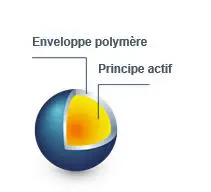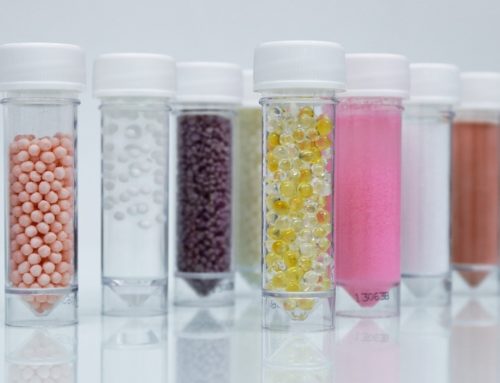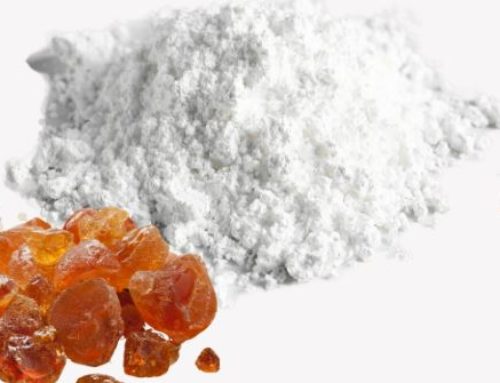
On Thursday, April 24, 2025, Le Mans Université, the CNRS, the La Rochelle-based company Capsulæ, the French National Research Agency (ANR), and the Pays de la Loire Region inaugurated a joint laboratory in Le Mans dedicated to research in the field of microencapsulation: the LabCom ECCOCAPS. Over the next five years, teams will collaborate scientifically to develop biodegradable microcapsules, thereby reducing the environmental impact of microencapsulation.
Microencapsulation: A Growing Market
 Microencapsulation involves enclosing an active ingredient (liquid or solid) in microparticles generally made of polymers to protect it, release it in a controlled manner, or provide structural benefits.
Microencapsulation involves enclosing an active ingredient (liquid or solid) in microparticles generally made of polymers to protect it, release it in a controlled manner, or provide structural benefits.
This process is used across many industrial sectors: cosmetics, pharmaceuticals, detergents, agri-food… For example, it enables prolonged release of medicinal ingredients or protects fragrances in perfumed laundry products and softeners.
In 2021, the global microencapsulation market was worth nearly 10 billion euros.
An Ambitious and Eco-Responsible Project
The Institute of Molecules and Materials of Le Mans (IMMM – CNRS/Le Mans Université) and the company Capsulæ are pooling their expertise by creating a joint laboratory: LabCom ECCOCAPS (for “Eco-Design of Innovative Capsules“).
The goal of this lab is to reduce the environmental impact of microencapsulation—from the design phase, using bio-sourced raw materials and environmentally friendly processes, to the end-of-life of the products.
“Microcapsules most often used in sectors such as detergents, cosmetics, and crop protection, due to their composition and size (<5 mm), fall under the definition of intentionally added microplastics,” explains Laurent Fontaine, chemistry lecturer-researcher at Le Mans Université and scientific lead on the project.
“The European Chemicals Agency estimates that up to 60,000 tons of intentionally added microplastics—such as those in detergents—end up in the environment each year.”
“The LabCom ECCOCAPS—between Capsulæ, a specialist in microencapsulation, and the Institute of Molecules and Materials of Le Mans (IMMM – CNRS/Le Mans Université), an expert in functional materials—will rely on research involving click chemistry to replace some commonly used but potentially toxic reagents. Thanks to an eco-design approach based on ‘safe by design’ principles and the use of bio-sourced precursors for the development of biodegradable microcapsules, LabCom ECCOCAPS will help reduce the environmental impact of both liquid- and solid-core microcapsules by avoiding the emission of microplastics into the environment,” adds Pascal Breuilles, Deputy Scientific Director for Industrial Partnerships at CNRS Chemistry.
A Strategic Research-Industry Collaboration
The creation of this joint laboratory marks a new stage in the collaboration between IMMM and Capsulæ. “This collaboration began in 2019, when Capsulæ was still based in Nantes, with the hiring of a PhD student under the CIFRE scheme (Industrial Agreements for Training through Research). Her work led to a joint patent application, highlighting the value of several years of research into the future of microencapsulation,” explains Arnaud Picot, Head of Partnerships at Capsulæ.
ANR’s LabCom Program: A Flexible Mechanism to Support Socio-Economic Development
LabCom ECCOCAPS, a recipient of the ANR’s LabCom call for projects, is receiving €363,000 in funding for a period of 54 months. “The ANR’s LabCom initiative aims to support the creation of joint laboratories between companies (start-ups, SMEs, and mid-sized firms) and academic research players, as part of a broader innovation support strategy. The goal is to help socio-economic players become more competitive and tackle contemporary challenges. LabCom ECCOCAPS—focusing on R&D of innovative technological solutions to reduce the environmental impact of microencapsulation—is a great example of this approach. We are proud to support the teams from the Institute of Molecules and Materials of Le Mans (IMMM – CNRS/Le Mans Université) and the company Capsulæ in this long-term partnership,” says Dominique Dunon-Bluteau, Scientific Advisor at the ANR.
Support from the Pays de la Loire Region
“The Pays de la Loire Region supports collaborations between public laboratories and businesses. Our goal is to ensure that regional scientific research can contribute to technology transfer for our companies, enhancing their competitiveness and creating jobs in our region. The many current challenges—energy, environmental, economic—require that we ‘team up’ and accelerate the transition from cutting-edge discoveries to real-world applications. We are delighted that the ‘ECCOCAPS’ joint lab between Le Mans Université and Capsulæ contributes to the ecological transition while also creating value. The Region is also contributing €50,000 in funding to the joint lab,” says Franck Louvrier, Vice President of the Regional Council in charge of the economy.
Contacts
- Le Mans Université : presse@univ-lemans.fr
- CNRS : alexiane.agullo@cnrs.fr
- ANR : contactpresse@anr.fr
- Région Pays de la Loire : christelle.jousset@paysdelaloire.fr
- Capsulæ : arnaud.picot@innov-ia.com
Contact-us
"*" indicates required fields



